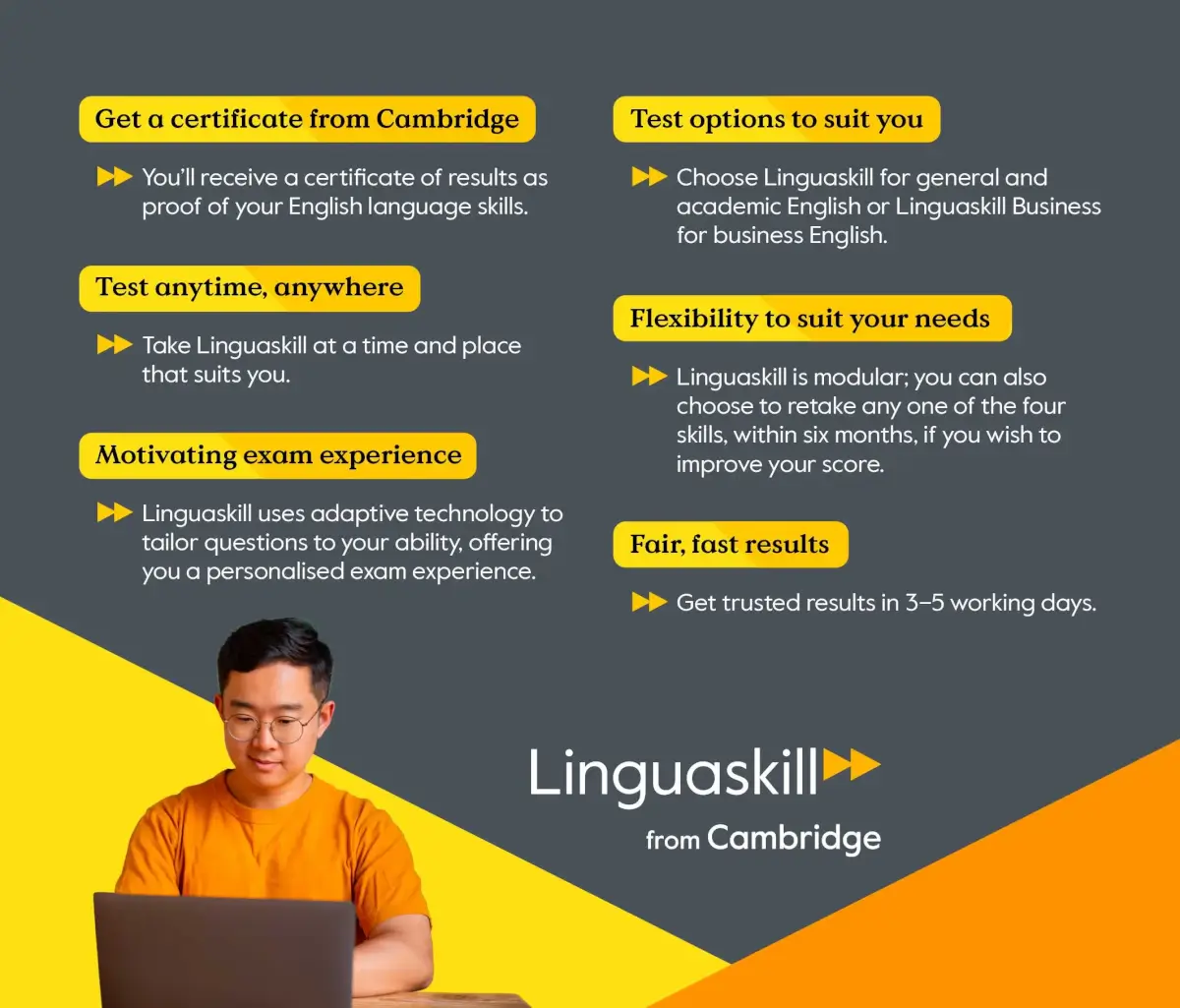The English test with fast and accurate results
Linguaskill is a multi-level online test designed to help organisations check the English levels of individuals and groups of candidates. Powered by Artificial Intelligence technology, the adaptive assessment tests all four language skills - speaking, writing, reading and listening - in modules. Linguaskill provides fast accurate results and can be taken at any time or place, even from the comfort of your own home*.
*The online version is currently unavailable.
All you need is a computer, internet connection, a microphone and headphones. Results are aligned to the Common European Framework of Reference (CEFR), the international standard for describing language ability.

Key facts
- CEFR level: B1 to C2 What's this?
- Exam format: Online adaptive modular test
- Skills tested: Reading, Listening, Writing, Speaking
The test provides an appropriate option for those who need to prove their level of English in order to graduate from university, apply for a grant or scholarship, begin a post graduate course or take a civil service exam.
The test results are a secure, reliable indicator of language ability and Linguaskill is officially recognised by CRUE (Conferencia de Rectores de las Universidades Españolas).

Linguaskill and Linguaskill Business
Two exam options are available, Linguaskill and Linguaskill Business, depending on whether you require everyday English or English for a business setting. Talk to us to find out how Linguaskill can help you.

Linguaskill General English
- Linguaskill General tests language used in daily life, making it ideal for university admission or exit, and recruitment for roles in a non-business-specific environment. For example, where the employee needs strong English skills to perform their role effectively, but will not need specialist business terminology.
- This makes the test suitable for a broad spectrum of organisations. Test topics include studying and working, making future plans, travel and technology.

Linguaskill Business English
- Linguaskill Business tests English used in a business and corporate setting, and is most suitable for recruitment in organisations where employees are expected to be familiar with the language of business.
- It is suitable for large or small organisations, which may be operating on an international level. Test topics include the buying and selling of products or services, the office, business travel and human resources.

Why choose Linguaskill

Linguaskill tests language used in daily life, making it ideal for university admission or exit, and recruitment for roles in a non-business-specific environment.
The exam assesses whether a candidate’s language ability is at a level where they can communicate effectively in everyday situations.
- A trusted certificate – a certificate of proficiency proves that someone has the English skills to succeed.
- Online and on-demand flexibility – the exam can be taken at any time or venue.
- Fast, accurate results – reliable results powered by AI technology are quickly delivered. Linguaskill has been extensively researched and trialled by speakers of over 40 languages from 50 countries to ensure the accuracy and reliability of the results.
- Scores to C2 – the highest proficiency level – find the best communicators to drive your business forward.
- Personalisation through adaptivity – Computer adaptive testing makes the exam experience personalised and motivating.
- Extensive preparation materials – learning resources include sample tests, videos and an online exam preparation course
Linguaskill Business is for students entering the workplace at graduate level, or employees who need certification for professional development or promotion.
The exam assesses whether a candidate’s language ability is at a level where they can communicate effectively in the workplace.
- A trusted certificate – a certificate of proficiency proves that someone has the English skills to succeed.
- Online and on-demand flexibility – the exam can be taken at any time or venue.
- Fast, accurate results – reliable results powered by AI technology are quickly delivered. Linguaskill has been extensively researched and trialled by speakers of over 40 languages from 50 countries to ensure the accuracy and reliability of the results.
- Scores to C2 – the highest proficiency level – find the best communicators to drive your business forward.
- Personalisation through adaptivity – Computer adaptive testing makes the exam experience personalised and motivating.
- Extensive preparation materials – learning resources include sample tests, videos and an online exam preparation course
